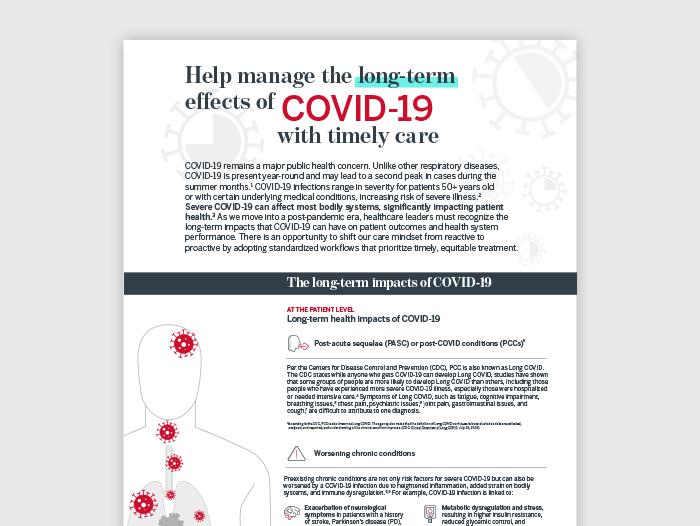Auto logout in seconds.
Continue LogoutAs the United States heads into the fall and winter, CDC predicts the country will see a "moderate COVID-19 wave" and a "typical" flu and respiratory syncytial virus (RSV) burden, similar to last year, Shannon Firth writes for MedPage Today.
What CDC predicts for the fall and winter viral season
According to CDC, this year's fall and winter virus season will be similar to what the country faced in 2022. Currently, the agency is predicting a "moderate COVID-19 wave" and "typical" flu and RSV burden.
Dylan George, director of CDC's Center for Forecasting and Outbreak Analytics, said these forecasts are based on expert opinion, historical, and "some modeling results," particularly for the potential COVID-19 trends.
"The bottom line here is we're likely to have a similar number of total hospitalizations as we had last year," George said. However, he also noted that "we have to be very humble about this assessment because there's lots of uncertainties associated with this," particularly regarding the timing and magnitude of each virus' peaks.
According to George, CDC could still change its assessment for the viral season if any of the following things happen:
- A COVID-19 variant that behaves differently, such as causing a higher degree of spread, emerges
- A "coincidence" of the peaks of COVID-19, flu, and RSV
- The United States experiencing an "unusually bad" flu season
So far, none of these things have occurred, "but we need to stay vigilant and watch all three areas," George said, noting that "having three circulating respiratory illnesses is worse than having two."
"We're learning more about each of these pathogens on a daily basis," he said. As we learn more, we will update our assessments and we will update you at that time as well."
CDC outlines vaccine recommendations for the fall and winter
In addition to the forecasts, CDC has outlined specific vaccine recommendations for all three viruses:
COVID-19
Regardless of prior vaccination history, all individuals ages 5 and older who are not immunocompromised should receive one dose of an updated COVID-19 vaccine. FDA has authorized new COVID-19 vaccines from Pfizer-BioNTech, Moderna, and Novavax.
Children ages 6 months to 4 years who have been previously vaccinated should receive either one or two doses of an updated vaccine, depending on how many vaccine doses they've previously received. Immunocompromised individuals may also receive additional doses of the new vaccines after discussions with their providers.
CDC officials have also acknowledged difficulties that some patients have faced getting COVID-19 vaccines for themselves or their children in recent weeks but said they should not give up.
"Please know that vaccine is available ... more and more vaccine is getting out there every single day, every single week," said CDC Principal Deputy Director Nirav Shah. "And so please check back in with your provider, with your pharmacist, because it's likely if they didn't have vaccine 2 weeks ago, they will have it or have it now."
Flu
All individuals ages 6 months and older who are not contraindicated for a flu vaccine should receive one. Adults over 65 are also recommended to get a higher dose or adjuvanted vaccine, if possible, but if it's not available, any vaccine is fine.
According to Demetre Daskalakis, acting director of CDC's National Center for Immunization and Respiratory Diseases, it is particularly important for infants and older adults to get vaccinated against the flu since they have a higher risk of complications from the virus.
RSV
Adults over 60 may receive one dose of an RSV vaccine after a discussion and shared clinical decision making with their provider. Pregnant women at 32 to 36 weeks of gestation have also been recommended to receive a vaccine to prevent lower respiratory tract RSV infection in infants.
CDC has also recommended the monoclonal antibody nirsevimab for all infants younger than 8 months born during or entering their first RSV season, as well as infants ages 8 to 19 months entering their second RSV season and may be at an increased risk of severe illness.
Aside from vaccines, Daskalakis also noted that treatments are available for both flu and COVID-19, and that the therapies must be started soon after symptoms appear to be most effective.
"While we don't know what's in store for this fall and winter ... we know that it's critical to take advantage of safe and effective immunizations, the treatments that we know work, and all the precautions that we've learned to help protect ourselves, not just from one, but from three, viruses," Daskalakis said. (Firth, MedPage Today, 10/4)
Given the potential influx of respiratory diseases in the United States, health experts are advising caution this holiday season. Here are five ways you can keep safe.
Don't miss out on the latest Advisory Board insights
Create your free account to access 1 resource, including the latest research and webinars.
Want access without creating an account?
You have 1 free members-only resource remaining this month.
1 free members-only resources remaining
1 free members-only resources remaining
You've reached your limit of free insights
Become a member to access all of Advisory Board's resources, events, and experts
Never miss out on the latest innovative health care content tailored to you.
Benefits include:
You've reached your limit of free insights
Become a member to access all of Advisory Board's resources, events, and experts
Never miss out on the latest innovative health care content tailored to you.
Benefits include:
This content is available through your Curated Research partnership with Advisory Board. Click on ‘view this resource’ to read the full piece
Email ask@advisory.com to learn more
Click on ‘Become a Member’ to learn about the benefits of a Full-Access partnership with Advisory Board
Never miss out on the latest innovative health care content tailored to you.
Benefits Include:
This is for members only. Learn more.
Click on ‘Become a Member’ to learn about the benefits of a Full-Access partnership with Advisory Board
Never miss out on the latest innovative health care content tailored to you.


